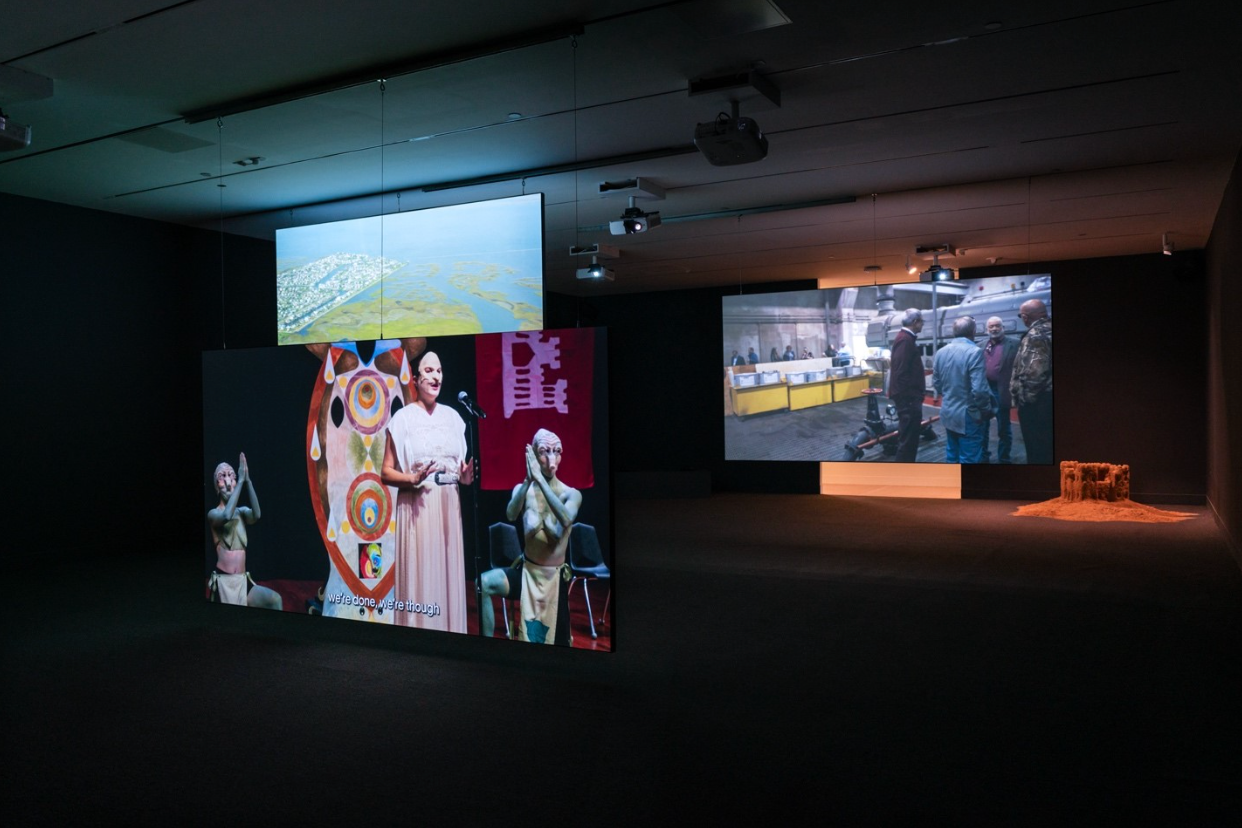Panel discussion and performance: If the water gets in

Installation view of Fred Schmidt-Arenales: IT IS A GOOD PROJECT AND SHOULD BE BUILT at the Visual Arts Center, 2024. Photo: Alex Boeschentein.
Held in conjunction with the exhibition IT IS A GOOD PROJECT AND SHOULD BE BUILT at the Visual Arts Center, this panel discussion will explore pressing ecological, economic, and political challenges faced by coastal communities in Texas and beyond due to increasing superstorms and sea level rise.
Renowned experts in environmental engineering, law, and public policy and artist Fred Schmidt-Arenales will delve into these complex issues. Following the panel, Department of Theatre and Dance students will present Jacob Brunner's original score, Song for Mr. Death. This satirical ballad parodies the bureaucratic language often used to justify government-sponsored superstorm infrastructure projects.
This event is presented through the support of Planet Texas 2050 – A UT Grand Challenge.
About the guests:
Fred Schmidt–Arenales is an artist and filmmaker. His projects attempt to bring awareness to unconscious processes on both individual and group levels. He has presented films, installations, and performances internationally at venues including SculptureCenter and Abrons Arts Center (New York), Links Hall (Chicago), The Darling Foundry (Montreal), Lightbox Film Center and Institute of Contemporary Art (Philadelphia), Artspace (New Haven), The Museum of Fine Arts and FotoFest (Houston), Künstlerhaus Halle für Kunst und Medien (Graz), and Kunsthalle Wien (Vienna). His recent film Committee of Six was an official selection of the 2022–23 Architecture and Design Film Festival (New York) and was awarded a jury prize for best film at the 2023 Onion City Experimental Film Festival (Chicago).
Clint Dawson is the chair of the Department of Aerospace Engineering and Engineering Mechanics and the director of the Computational Hydraulics Group at the Oden Institute for Computational Engineering and Sciences. He received a Bachelor of Arts and Master of Science in Mathematics from Texas Tech University in 1982 and 1984, respectively. He received his Ph.D. from Rice University in 1988 in mathematical sciences. From 1988 to 1990, he was a National Science Foundation Postdoctoral Fellow and Dickson Instructor in the Department of Mathematics at the University of Chicago. In 1990, he returned to Rice as an assistant professor in the Department of Computational and Applied Mathematics. He was promoted to associate professor at Rice University in 1994. He moved to the University of Texas in 1995. He was promoted to full professor in 2000. He was named the Edward S. Hyman Endowed Chair in Engineering in 2011 and received the John J. McKetta Centennial Energy Chair in Engineering in 2014.
Dr. Dawson has authored or co-authored over 200 technical articles in the areas of numerical analysis, numerical methods and parallel computing, with applications to flow and transport in porous media, and shallow water systems. In 2001, he was elected Chair of the Society for Industrial and Applied Mathematics Activity Group on Geosciences. He has served on numerous conference organizing committees, review panels, and editorial boards. He is currently the managing editor of Computational Geosciences. In 2011, he was given the Institute for Computational Engineering and Sciences Distinguished Research Excellence Award. He received the Society for Industrial and Applied Mathematics Geosciences Career Prize in 2013. He was named a Fellow of the Society for Industrial and Applied Mathematics in 2016.
Katherine Lieberknecht is an associate professor in the Community and Regional Planning program at the School of Architecture at The University of Texas at Austin. She researches environmental planning centered around equity, with specific focus areas on climate planning, green infrastructure planning, and water resources planning. Prior to joining the faculty, she worked in regional land conservation.
Kristen Schlemmer is the Sr. Legal Director and Waterkeeper for Bayou City Waterkeeper, located in her hometown of Houston, Texas. Her work with Bayou City Waterkeeper uses the law to confront water injustice, from water pollution and infrastructure failures to wetlands destruction and flooding to inequities in climate mitigation and disaster prevention. In this role, Kristen helped secure a $2 billion consent decree transforming Houston’s wastewater infrastructure over a generation.
Before joining Bayou City Waterkeeper, Kristen’s legal work included developing a precedent-setting legal theory for families flooded during Harvey, defending the city of Houston’s equal rights ordinance, and representing marine mammal scientists in seeking better living conditions for a captive orca. She previously worked at Susman Godfrey LLP and Irvine & Conner PLLC and clerked for two federal judges.
Her perspective is shaped by her childhood in Houston and South America, previous translation work with Brazilian human rights organizations, earlier advocacy focused on wildlife and farmed animals, legal education at Tulane in post-Katrina New Orleans, experience tending wild gardens, and motherhood. She is a Texas Gulf Coast Master Naturalist and previously served on the local board of the New Leaders Council, the regional group of the Sierra Club, Lone Star Chapter, and the Houston advisory group for the Texas Civil Rights Project.




